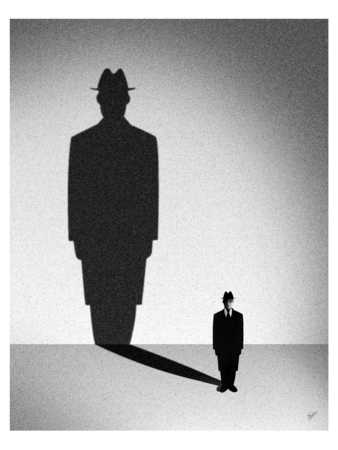One of the reasons why I got to know my Dad so well in the last 4 to 5 years is because I spent more time with him.
On weekends at school, I would come home, play video games, go shooting with my Dad on Saturday, watch a movie with him and my mother at night, play video games, sleep, play video games, and then get driven to school. Almost every weekend played itself out like this.
Some weeks I would go shooting more than once during the summer. It took about an hour to drive to the shooting club and an hour to drive back which gave me ample time to pick his brain on all sorts of things. One of the things I learned was the idea of Emotional Intelligence, or EQ. EQ is essentially your ability to control yourself and your emotions. That is to say, how you conduct yourself when you are highly emotional and when you are not. If you are in a sour mood and behaving badly, your EQ is low. If you are in a sour mood and you are behaving good your EQ is high.
I remember when I went shooting with my Dad the first time. My Dad hit most of the clays he shot at.The instructor made a cursory effort at safety instruction and then it was my turn to shoot. I shot a twenty gauge over and under. Out of fifty clay birds I shot at, I hit three of them. I was ecstatic. We drove home and I showed my mom the guns we shot with, my shooting kit (that’s gear for Americans) and was so proud of myself. She was almost as proud as I was until I almost put the dirty guns on her white couch. I still laugh at that.
The next time I went shooting with my Dad, we went to the West London Shooting club. Met up with an instructor, Tim. Tim gave me another safety brief and then my Dad and I took turns shooting at the traps. Right away, I noticed that my Dad seemed to be hitting all of the clays, and I wasn’t. Tim, with his eagle eye, told me that I held my gun like a pillow. He showed me how to properly mount the gun. Immediately I shot a little better. At the end of the session, my Dad and I ate bacon sandwiches with brown sauce and I got ice cream.
As the year went on we shot many more times and many more types of birds. We shot crossers, teals, driven birds, rabbits, pairs, going away, and even some mini birds.

As we shot in the first year, my Dad and I would compete. On friendly terms of course. Sometimes we’d bet one pound to make it annoying, sometimes we’d bet an ice cream, and sometimes he’d be a dick and bet me my ride home. Despite the fact that these bets weren’t serious, I’d get pissed off when I didn’t shoot as many clays as my Dad. I had stands I disliked, mostly the driven birds at first. When I shot poorly, I would get pissed. And when I got pissed, I would shoot even poorer. It was a vicious cycle.
Eventually I got a little better, but I would still have bad days and get extremely pissed. I didn’t talk much as it was, with Tim or Dad when we shot. When I pissed, I was dead silent. I seethed inside with anger. My Dad of course (and Tim) would joke with me, send barbs my way when I shot, and I would get distracted when I was shooting and miss clays. I tried to do the same to my Dad but his concentration never broke. The one day I told him a girl I was seeing was pregnant, he paused for a second, but missed only one clay on a double.
My Dad and I would talk about this at length in the car. He explained to me that I was just beginning and that I shouldn’t expect to shoot well right away, let alone better than him when he had been shooting shotgun for a while already. He explained to me that, even if I felt pissed or annoyed, I should just let it slide. Eventually, I adopted the mantra, “I’m here to learn and have fun. I’ll have good days and bad days. So be it.”
Eventually, over the year, we both got better. I was always really good at crossers and going away birds, but couldn’t shoot driven birds for shit. I missed damn near every one of them it was so frustrating. My Dad could shoot the ones I couldn’t and shot them well. The only problem he had was shooting crossers, which was a holdover from his rifle shooting days. Being an expert with a rifle, his instinct was to stop moving the gun as soon as he fired. He also had a problem with the concept of lead, giving too little or too much. I loved lead and shot through crossers no problem. When he shot doubles, he sometimes had trouble shooting the second clay pigeon after he shot the first. Other times he would shoot the wrong clay first so that the other one had already hit the ground before he could shoot it. My favorite stand was a doubles stand because I sometimes got two birds with one shot. The one and only day I beat my Dad shooting was won at that stand. I have the date written on a special hat somewhere. It was my second year shooting for sure.
Another problem I encountered shooting was my jerking of the gun. When I would shoot, I would unconsciously jerk the gun in any random direction other than where it was needed. When I had low EQ I jerked the gun more. When I shot with my Dad’s twelve gauge I jerked less because of the weight, but I preferred to shoot with my twenty gauge all the same. I had a twenty gauge, Beretta, silver pigeon. I still have it. The next problem I had is that I shot from the mounted position. This made it hard to see some clays, because I shoot right handed, but am left eye dominant. This is what made it so hard to shoot driven birds. I would track them with my gun, but as soon as my gun covered up the clay, I would jerk my gun when I shot, missing nearly every one. However, Tim taught me how to shoot the gun from an unmounted position and bring it up to my cheek to the same place every time As soon as I got good at that, I shot the driven birds really well. They are now my favorite bird, shooting them a testament to the obstacle which I overcame. My good grasp of lead made it easier to shoot targets far away than my Dad and eventually I started to shoot close to his level.
I learned other things like setting up my feet so as to have maximum swing over my kill zone area. I learned how to turn my gun when I brought it up to track driven birds that curve (so much fun!) I learned how to take my Dad’s barbs and Tim’s barbs without being annoyed by them and I learned how to retort with my own. I only out shot my Dad once, but nobody in my family has been able to ever out-shoot me. My older brother to this day, is probably still annoyed that I shot better than he did that one New Year’s, even though he had been in the army and worked elsewhere that required shooting.
My Dad and I shot through the rain, sleet, and snow. Towards our last year we had gone from shooting C to B to A level (70/100 to 80/100 to 90/100 clays, roughly). If we had kept it up, we may well have entered AA and AAA (World Champion) level. We planned to go competitions to try it out and see how good we really were, but unfortunately, never got around to it. Sometimes, I’d joke with my Dad that I was going to buy my favorite gun, a bolt action Karabiner 98k, and shoot sport clays with it. One day I will. In the last year, I almost never had a bad day, and when I did, it was simply because I didn’t shoot as many clays as normal, and would have been considered a good day when I shot my first year.
We had a lot of fun shooting at West London and Tim’s a great instructor, in our opinion, the best. I didn’t speak much of him, but he’s got a terrific eye and whenever we have a chance we go shooting with him. Shooting with him is as much a pleasure as it is educational. If I ever got married, he’d be invited to the wedding.
My Dad and I still compete when we shoot with the difference that now I don’t give a damn if I win or not. I’m just happy to be shooting and spending some quality time with my old man.

Not my gun, but similar
~Wald
P.S. I also realize that, if I can shoot a clay at 100 yards away, with lead if needed, shooting a man is trivial in comparison.




